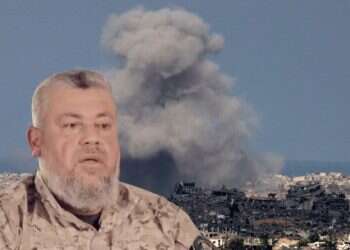"It's only a matter of time before some tragic event happens to us." This refrain has come up over and over again in conversations with Jewish students in the United States in the days following Hamas' terrorist attack on October 7.
Follow Israel Hayom on Facebook, Twitter, and Instagram
In recent days, with the intensification of the IDF's activity in Gaza, there has been a surge in pro-Palestinian activism on American campuses. While university presidents at prestigious institutions like Harvard and Columbia continue to refuse to unequivocally condemn Hamas' terrorist attacks, there is growing legitimization given to a handful of violent students on campuses to attack those who support Israel, further deepening the divide between the progressive movement in the US and Israel.
Jewish students had no respite in the past week. In Washington Square Park, adjacent to New York University, a demonstrator held a sign that read: "Please keep the world clean," alongside a drawing of a trash can with a Star of David inside.
Video: Bird's eye view of dueling protests over the Israel-Hamas war at Columbia University / Credit: Reuters
At Columbia University uptown, the head of a pro-BDS student organization published an invitation to a gay film festival and emphasized that "It's FREE PALESTINE over here. Zionists aren't invited." In an email circulated to organization members, she stated: "WHEN I SAY THE HOLOCAUST WASN'T SPECIAL, I MEAN THAT."
A particularly disturbing incident occurred at Cooper Union: Jewish students barricaded themselves in the library while protesters demonstrated against Israel outside the locked doors. The event only ended when the New York police entered the scene and escorted the Jewish students outside the college.
"While the students at Cooper Union have a right to peacefully protest, hate has no place in our city," New York City Mayor Eric Adams said after the incident.
Anti-Israel sentiments also receive support from some faculty members. For example, at the University of California, Berkeley, a lecturer in the course "Asian American Communities and Race Relations" offered students extra credit for "attending the national student walkout tomorrow against the settler-colonial occupation of Gaza" at the university, or for "watch a short documentary on Palestine and call/email your local California representatives." Students were required to submit a screenshot of their participation in one of these activities to receive the credit.
Hate speech is not confined to public spaces but has entered classrooms. The Middle East and Islamic Studies program at Columbia University is perhaps the most combustible place on campus, some professors have asked students to read clearly pro-Palestinian material, including Rashid Khalidi, a professor of Modern Arab Studies known for his anti-Zionist views.
Ella Cheezik, who is pursuing a Master's degree in the department, said that classes have become battlefields. "Students who study with me come to class after reading the incitement materials on the reading list, and in the end, they justify Hamas' terrorism," she says. "They say to me directly, 'Why should we believe you and not Hamas? Show me pictures of decapitated children or raped women, but even if I show them, I'm not sure they'll believe me. I feel that truth and facts no longer matter. It greatly troubles me that these students could be future influential leaders."
She describes a growing sense of insecurity that Israeli students on campus share. "I choose to express my opinion in class, and I know I'll pay a price for it. I'm afraid to leave the classroom because I don't know who's waiting for me outside and what they might do to me. But nothing will deter me: I won't stop telling Israel's story."
"I'm afraid of being a target for an attack," Omer, an Israeli student pursuing an MBA at Stanford, says. "I'm not far from my residence, I make sure to look over my shoulder, and I'm debating whether I should put a mezuzah on my dorm room door. The university administration is just walking on eggshells: It's afraid to condemn in a clear and unequivocal manner and doesn't want to turn the campus into a political arena."
Omer notes that as the death toll in Gaza rises, anti-Israel sentiments on campus are strengthening. "All the toxicity is coming out these days, and it's only getting worse. I saw a student waving a sign that read: "'Why are Hamas terrorists and the IDF not terrorists?'"
The students' fears are also shared by faculty members from Israel. "There's a sense of helplessness; we want to put out one fire after another, and it doesn't end," says Professor Jonathan Levav, a professor of marketing at Stanford Graduate School of Business. "We are truly fighting for our lives here, with hate speech that I haven't seen in 20 years in academia. The war in Gaza will end before the campus war. If we don't win the battle here, the Jewish identity of the students will erode, and Jewish communities in the Diaspora will be harmed."
Meanwhile, across the United States, a movement of alumni and faculty members is forming to combat hate speech, and it is succeeding in bringing about change. Over 1,000 Stanford graduates sent a letter to university President Richard Saller, demanding that he condemn Hamas' terrorist acts and make it clear that hate speech and violence against Jewish students will not be tolerated. "We write to you as appalled members of the Stanford community, with grave disappointment in your response to the atrocities committed by Hamas in southern Israel – the worst mass murder of Jews since the Holocaust – and the growing expressions of hate and persecution on campus that have followed," they wrote
Yasmin Lukatz, a Stanford alumnus and donor, said: "The demand for an academic institution to condemn Hamas' massacre is basic and necessary, but is hardly enough." She said donations to the university should be used for activities to combat antisemitism on campus. "Instead of stopping the donations, we believe that the university should establish a professional body to build a comprehensive program to fill the void when it comes to knowing about Israel and that this would include subject matter dealing with combating antisemitism in all educational settings that deal with equality and social diversity. Later on, the university will need to conduct surveys to check if antisemitic incidents on campus are decreasing."
Another Stanford alumni, Sophia Shramko, joined the Israel advocacy effort and received mixed reactions. "Students privately thank me for speaking out because they are afraid to do so," Sharmeko, who is originally from Northern Israel and rose to a high-ranking position in Amazon, says. "Others claim that I am on the payroll of the Israeli government." In one case, there was even a thinly veiled threat. "After speaking on a panel days after the attack, seven Hamas supporters were waiting for me outside. I had to ask an Israeli on the spot to watch over me." When Stanford turned to her to participate in a panel on career development, she refused. "I won't assist the university in any way until they issue a clear condemnation of Hamas." In the meantime, Stanford alumni have managed to see results in their efforts: The dean of the business school published a correction to a statement he issued.
Meanwhile, the politicians in the US have also entered the fray. Florida Governor Ron DeSantis, has ordered that state universities immediately halt antisemitic expressions on their campuses, and has threatened to take punitive action against faculty members and students behind protests against Israel.
Republican presidential hopeful Nikki Haley, who, like DeSantis called for federal funding to be stopped for educational institutions that allow expressions of antisemitism within their domain.
The White House has also addressed the events, "The actions on campuses turn the stomach and remind us of the saying 'Never again,' which we must not forget. De-legitimizing the State of Israel while praising the Hamas murderers who burned innocent lives, or harming Jewish students, is anti-Semitism by definition."
"Amidst the rise in poisonous, antisemitic rhetoric and hate crimes that President Biden has fought against for years, there is an extremely disturbing pattern of antisemitic messages being conveyed on college campuses," White House spokesperson Andrew Bates said in the statement."Just over the past week, we've seen protests and statements on college campuses that call for the annihilation of the state of Israel; for genocide against the Jewish people. Jewish students have even had to barricade themselves inside buildings. These grotesque sentiments and actions shock the conscience and turn the stomach."Bates added, "Delegitimizing the State of Israel while praising the Hamas terrorist murderers who burned innocent people alive, or targeting Jewish students, is the definition of unacceptable — and the definition of antisemitism. President Biden is proud to have been an enemy of antisemitism and hate his entire life, and he always will be."
Subscribe to Israel Hayom's daily newsletter and never miss our top stories!




